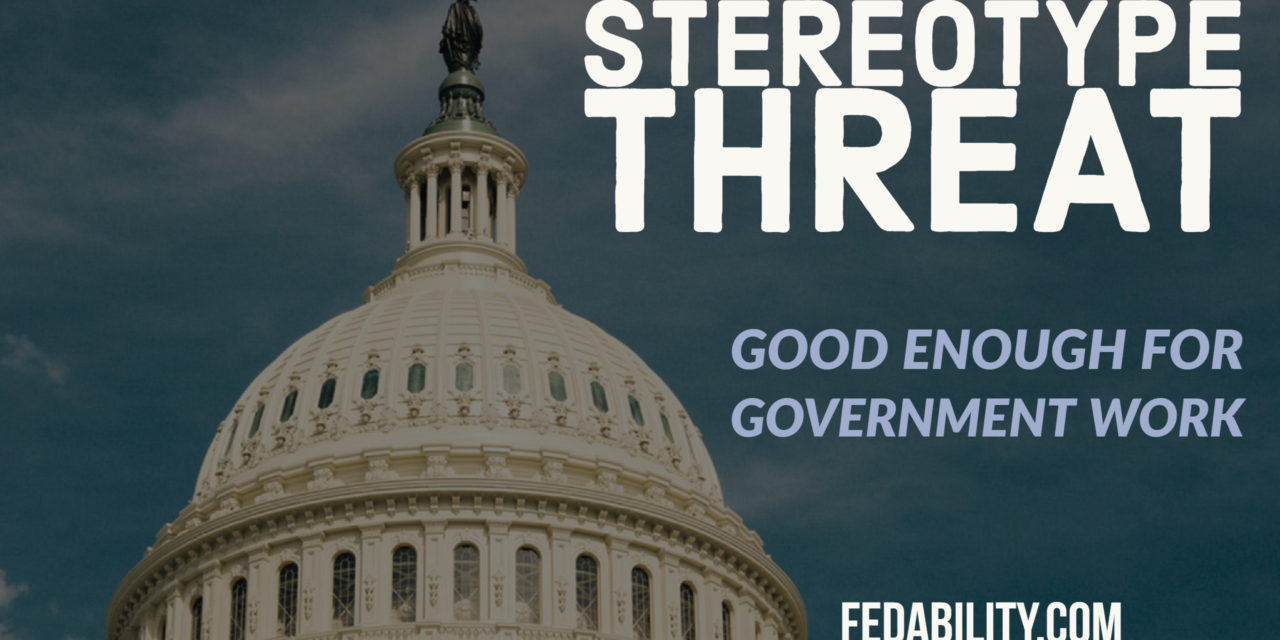Have you ever received mediocre product and thought, “Well, it’s good enough for government work”? It’s a phrase that we’ve all heard at some point in our lives regardless of whether we have worked for the government. When we hear the phrase, some of us laugh. Some of us cringe. Others of us acknowledge that it’s sometimes true. But, for those of us who work for the government, it may be triggering a stereotype threat.
Last week I was discussing with a colleague her masters thesis topic. And, in the course of our discussion on self-efficacy and ethnicity what immediately came to mind for me was stereotype threat. As we discussed it further, I started to think it was something that could impact government employees.
What is stereotype threat?
In a book aptly titled, Stereotype Threat, the concept is explained as individuals at risk for confirming a negative stereotype about a group they strongly identify themselves with. The authors go further to say these individuals believe they will be judged by the negative stereotypes of their association than on personal merit.
The research in stereotype threat is predominately around ethnicity and gender. To my knowledge, it has not been applied to one’s association with a particular organization or company. However, it is a reasonable to make the leap to say that people personally identify with the company they work for.
This is especially the case for government employees who are more likely to personally support the mission of the agency with which they work. Research by Booz Allen Hamilton and the Center for Creative leadership found that just over 50% of government employees stay at their agency because of the agency’s mission.
What does it mean to be “good enough for government work”?
Interestingly enough, the phrase was initially used in the WWII era. It meant that something must meet rigorous high standards of quality for Uncle Sam to accept it. It wasn’t until 1960 that the phrase actually became disparaging for government standards. Ironically, by a government entity.
The Military Air Transport Service (MATS) flyer states (V7, I4, page 5):
And so began the degradation of the belief that government work was typical of anything shoddy or mediocre. It also started the use of the phrase as a self-deprecating description of one’s work. It also set the stage for building a stereotype of what it means to work for the government.
Stereotype threat for government employees
Taken together that there’s a negative stereotype for the quality of work associated with government. And, one’s likely strong identification with being a government employee. It’s no grand leap to assume that many employees fall victim to stereotype threat.
What does stereotype threat typically look like?
An example from a study on stereotype threat would be something like this:
Female study participants are randomly assigned one of two groups. Group one reads an article about who women are bad at math. Group two reads an article about typical weather in Florida in June. Both groups then take a challenging math exam.
Group one, who has had the stereotype that women are bad in math invoked, will score significantly lower on the math exam.
Remember, participants in the study are randomly assigned. There’s nothing special about Group one that would cause them to perform more poorly on the math exam. Except, that they were reminded that as females they are more likely to be bad at math.
How might stereotype threat show up in government employees?
I will admit, there have been instances where I have performed less than optimally…and made the remark, “Eh, it’s good enough for government work.”
In some ways, I say this to protect my own self efficacy. It’s not that I would normally perform sub-optimally. It’s that I’m part of this group (i.e., government employees) that tends to perform sub-optimally so I’m just doing what they would do. This group has low standards…so, I’m not personally a bad performer.
But what if, I submitted the sub-optimal work because I was reminded I was a government employee? Perhaps there’s a part of me that thinks – what’s the point of trying any harder? What’s the point of doing any better?
Because here’s the thing. We receive reminders every day, throughout the day that we are government employees. From the security desk we pass through each day. To the notice on our computers each morning when we log in. To the color of our badges.
It would be impossible to forget that identification.
An article for FedManager puts it well that despite many being unsung heroes, government employees are told they are what is bad with our country.
Amazingly, this same group is most often the brunt of jokes by the rest of our citizens for being the epitome of what is wrong with our country. Instead of receiving the adulation of their fellow citizens, they must endure ridicule, and at times, hatred. No one appears to rise to their defense, proclaiming the repetitive great deeds which they perform in service to our country.
Redefining: Good enough for government work
There is an old saying that we are three people:
- the person we think we are,
- the person others think we are, and
- the person we really are.
My hope for you in this post is that you reconsider who you think you are.
That was a weird sentence. Let’s try it again. I challenge you to think of yourself as a government employee who accepts nothing less that superior, high quality work for the good of Uncle Sam. Just as they did during World War II.
- When faced with a product submitted by a contractor that’s not up to par – I want you to demand that it’s redone to the high quality standards that the government expects.
- When an employee submits something that is going out to the public – I want you to demand that it’s produced to the highest quality because that’s what our American tax payers deserve.
- When you think about giving up or doing ‘good enough’ – I want you to remember that you are a government employee and ‘good enough’ is a standard that we all can and should be proud enough.
Together, I want us to redefine what is good enough for government work. Because our country is depending on us. And, we owe it to ourselves to live up to the standard of government.
And, perhaps more importantly, because I know the person you really are. You are an amazing person with great potential who believes in the work we do – and I want you to think you are just as amazing as you are.
Want to hear more about this? Check out our Ted Talks Tuesday post about seeing your own value as a government employee.






